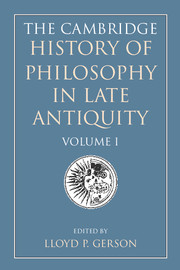Book contents
- Frontmatter
- General introduction
- I Philosophy in the later Roman Empire
- II The first encounter of Judaism and Christianity with ancient Greek philosophy
- III Plotinus and the new Platonism
- IV Philosophy in the age of Constantine
- V The second encounter of Christianity with ancient Greek philosophy
- Map 1 The Byzantine Empire, c. 500
General introduction
Published online by Cambridge University Press: 28 May 2011
- Frontmatter
- General introduction
- I Philosophy in the later Roman Empire
- II The first encounter of Judaism and Christianity with ancient Greek philosophy
- III Plotinus and the new Platonism
- IV Philosophy in the age of Constantine
- V The second encounter of Christianity with ancient Greek philosophy
- Map 1 The Byzantine Empire, c. 500
Summary
The present work is a successor to The Cambridge History of Late Greek and Early Medieval Philosophy (CHLGEMP) which appeared in 1967 under the editorship of A. H. Armstrong. Since the publication of that work, an enormous amount of fundamental philological and historical scholarship pertaining to the philosophical works of late antiquity has appeared. New critical editions, commentaries and translations of important philosophical texts have made this vast complex of material more accessible to historians, who in turn have made considerable advances in the understanding of the last phase of ancient philosophy. Although this more than forty years of labour seems justification enough for a new survey of the period, it should not be supposed that all or even most of the assessments made in the earlier work have been summarily invalidated. Hence, the sense in which the present work is a ‘successor’ to the earlier work does not indicate that it is a replacement. Students of this period will no doubt continue to profit from consulting the earlier work, which deserves to be recognized as groundbreaking.
It will be useful to point out how The Cambridge History of Philosophy in Late Antiquity (CHPLA) differs in some obvious ways from its worthy predecessor. First, the reader will notice that the subtle change in title presumes that much of what was once labelled – no doubt with a certain amount of diffidence – ‘early medieval’ is now more properly brought within the ambit of ancient philosophy. The reasons for this will be discussed below in this introduction and in various places throughout the volume. Here, it may simply be noted that the new title indicates a vigorous recognition of the extension of the canon of ancient philosophy far beyond the all-too-narrow confines of the fourth century bce.
- Type
- Chapter
- Information
- Publisher: Cambridge University PressPrint publication year: 2000
- 3
- Cited by



